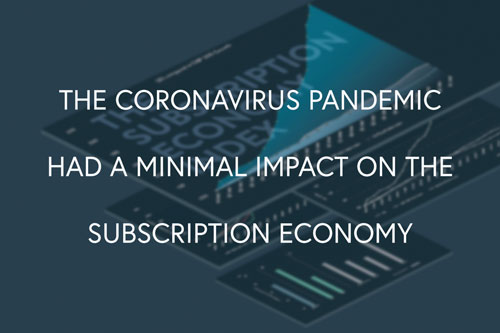 Depending on the industry and region your ISV or VAR business serves, activity may have ground to a halt in March 2020 and, perhaps, still didn’t pick up by the end of May. The coronavirus pandemic may have forced your clients to shift project statuses to “on hold,” put a moratorium on new spending, or close their doors completely during the crisis.
Depending on the industry and region your ISV or VAR business serves, activity may have ground to a halt in March 2020 and, perhaps, still didn’t pick up by the end of May. The coronavirus pandemic may have forced your clients to shift project statuses to “on hold,” put a moratorium on new spending, or close their doors completely during the crisis.
If your business relies primarily on license or hardware sales and project work, the crisis may have had a similar impact on your business. On the other hand, ISVs and VARs who are part of the subscription economy had money coming in to cover expenses. Research shows the model worked.
Zuora, a cloud-based subscription management platform provider, publishes a biannual Subscription Economy Index that tracks subscription businesses and their impact on the overall economy. Over 28 quarters, from January 2012 to December 2018, Zuora found that subscription businesses grew roughly five times faster than S&P 500 company revenue and U.S. retail sales. When the global economy shut down in 2020 due to the coronavirus pandemic, researchers took another look to see how subscription businesses fared. Zuora reports that during the crisis, subscription businesses have been “resilient.” One-quarter saw an increase in subscribers, and about one-half saw no change in growth. And, of the remaining quarter that experienced slower growth, half of them are still growing. Revenues may have been flat for ISVs and VARs that have transitioned to the monthly recurring revenue (MRR) model, but there were still revenues.
POS as a Service
One way to join the resilient subscription economy is to offer Point of Sale (POS) as a Service. Many POS ISVs have created a Software as a Service (SaaS) solution sold on a subscription basis rather than by license. Some POS solution providers have taken the as a Service concept one step further to provide total solutions, including software, hardware, and peripherals — all for a single monthly payment.
POS as a Service appeals to end users for numerous reasons. SaaS providers often bundle all software patches and updates, routine hardware maintenance and repair, and customer support in with the monthly fee, which eliminates the need for in-house IT to maintain the systems. SaaS also gives store or restaurant managers the ability to access business data from any location via the internet.
The financial aspects of POS as a Service are a big part of its value proposition. It transforms a POS system purchase from a large, capital expenditure into a manageable, predictable operating expense. Furthermore, because everything is included in one monthly fee, there aren’t any unexpected bills if the system needs repair. POS as a Service also eliminates risk. Businesses don’t have to make a large, upfront investment in a system that may be obsolete in a few years. Instead, they can work with their POS solutions provider to update or change their systems to meet their current needs.
For ISVs and VARs, POS as a Service can enable them to build a predictable, recurring revenue stream.
Payment Processing Residuals and Value-Added Services
Even if you don’t offer POS as a Service, there are other effective ways to build monthly recurring revenue (MRR). Many ISVs and VARs, for example, take advantage of the opportunity to collect payment processing residuals. POS solutions providers who sell merchant accounts along with POS systems have the opportunity to build recurring revenue from residuals based on a fraction of fees for each sale. If your business relied solely on payment processing residuals as your source of recurring revenue, however, your income during the coronavirus pandemic crisis likely decreased along with your clients’ sales.
ISVs and VARs can build a more predictable recurring revenue stream through value-added services such as selling gift cards, loyalty program, customer relationship management (CRM), and real-time survey solutions as a Service. Your customers want tools that can help them differentiate their businesses, personalize service and build stronger customer relationships — and you an provide those capabilities for a budget-friendly, recurring monthly fee.
Sustaining an ISV or VAR Businesses Through a Crisis
Although ISVs and VARs who are part of the subscription economy were well-positioned to keep revenues coming in when the economy shut down, they still had to work to keep their businesses afloat. Fortunately, businesses that provide services and solutions on a subscription basis have natural lines of communication with their clients. Smart ISVs and VARs used those channels to reach out to customers with information or suggestions that could help them adapt to new ways of doing business — such as focusing on online ordering vs. in-person sales.
Partnering with your clients to get through the crisis was a challenge. But, it was also an opportunity to confirm your role as a trusted advisor who provides solid advice, assistance, and the right tools to support their strategies. And that’s a great position to be in when the economy takes off again.



